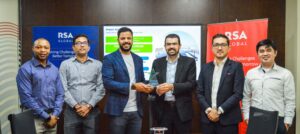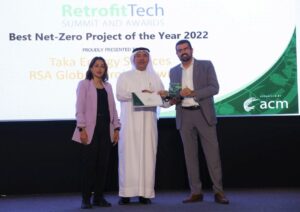How Taka Solutions helped RSA Global achieve 99% of energy sourced from clean sources
Net-zero and net-positive (NZ/NP) strategies emphasise taking a systematic approach to reduce water, energy and waste footprints in properties. These strategies provide long-term solutions for sustainability by meeting the environmental objectives of clean air and water, and reducing or eliminating waste sent to landfill, while ensuring the long-term viability of resources is not only maintained but also improved.
The Earth is already about 1.1 degrees C warmer than it was in the late 1800s, and emissions continue to rise. To keep global warming to no more than 1.5 degrees C – as called for in the Paris Agreement – emissions need to be reduced by 45% by 2030 and need to reach net-zero by 2050. Commitments made by governments worldwide to date fall far short of what is required. The changes required to reach net-zero emissions globally by 2050 are inadequately understood, and most international pledges by different countries are not yet supported by near-term policies and measures.

The RSA Global and Taka Solutions teams pose with the ‘Net Zero Project of the Year 2022 award’ trophy at the 7th MENA Retrofit Tech Summit & Awards, in March 2022 in Dubai
In the UAE, the Net Zero by 2050 strategic initiative, aligned with the Paris Agreement, is a national drive to achieve net-zero emissions by 2050. The country continues to lead and coordinate efforts to execute the initiative and ensure collaboration at national level to fulfil this objective. Specifically in Dubai, several strategies, such as the Smart City Strategy, Green Building Regulations for the private sector and Green Building and Sustainable Building standards have been implemented in recent years. In highlight is a case study relating to digital freight forwarding and supply chain solutions company, RSA Global and its successful achievement of net-zero in its warehouse facilities through the implementation of solar energy and energy efficiency measures.
Achieving net-zero through energy performance contracting
RSA Global, headquartered in the UAE, is working towards its sustainability objectives. With the adoption of NZ/NP strategies, RSA Global is striving to consume only as much energy as is produced, thus aiming to achieve a sustainable balance.
Phase I of the Net Zero Energy strategies adopted by RSA Global was the production of energy from a solar rooftop solution, with Taka’s sister company, Siraj Power, which comprises a system size of almost 3 MWp across three facilities. Following the successful operation of the solar rooftop solution, as Phase II of the Net Zero strategy, RSA Global appointed Taka Solutions to minimise the facility’s energy consumption and to complement the existing clean energy solutions, which were in operations.
Taka’s objective, aligned with RSA Global, was to achieve reduction in energy consumption in the most feasible and efficient way – that is, replacing existing outdated equipment and technologies with the most energy efficient systems that reduce operation and maintenance costs and improve savings, all aligned with the facility’s operational requirements.

During the execution phase of the project
Taka’s area of expertise is Energy Performance Contracting, which is a commercial agreement structure that allows for capital improvement that permits energy upgrades to be paid from cost reductions generated. Under an energy performance contract arrangement, an external organisation (ESCO), such as Taka, implements a project to deliver energy efficiency, or a renewable energy project, and uses the stream of income from the cost savings, or the renewable energy produced, to repay the costs of the project, including the capital costs. Essentially, the ESCO will not receive its payment unless the project delivers the expected energy savings.
Taka provided all engineering, equipment and investment (CAPEX and OPEX) for the project through a six-year, Shared Savings Energy Performance Contract (SSEPC). Some quick facts of the SSEPC are:
The Taka Solutions EPC process comprises three main steps:
1) The analysis phase: Used to identify the amount of savings available in the facility and the feasibility of making the savings happen.
Key services include:
2) Taka then implements the new energy-efficiency measures.
Services include:
3) Once the measures have been installed, the management and operation of the facility begins. During this period, Taka ensures systems are operated as designed to achieve savings forecasts.
Some of the services include:
A comprehensive engineering solution of seven Energy Efficiency Measures (EEMs) were implemented, including:
Results and impact
Through the implementation of SirajPower’s solar solution and Taka’s energy-efficiency measures, the project witnessed a phenomenal decrease in current energy spend compared to the facilities’ historical spend. The impacts of these approaches are that through the solar installation, 78.1% electricity is being generated; and the energy-efficiency measures yielded 20.9% of energy reduction, translating to 99% of energy sourced from clean sources, with only one per cent sourced from the grid.
Taka was able to generate 20.9% energy reduction across two warehouse facilities and electrical savings of 740,132 kWh, amounting to more than half a million kg of CO2 reduction. The energy reduction in the project alone is equivalent to CO2 emissions from 1,214 barrels of oil consumed, 579,742 pounds of coal burned, or 63,803,828 number of smartphones charged.
The project won the Net Zero Project of the Year 2022 award at the 7th MENA Retrofit Tech Summit, held in Dubai in March 2022. While net-zero is a goal, energy efficiency is one of the success factors that can be implemented to achieve carbon neutrality. Projects, such as the RSA Global initiative, make it clear that the Net Zero by 2050 strategic initiative can not only be achieved but can also be started in any other facility across the UAE.
Copyright © 2006-2025 - CPI Industry. All rights reserved.